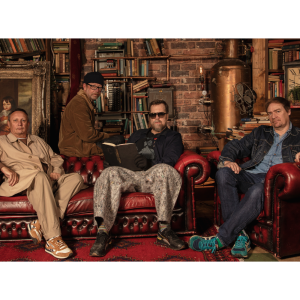
“I have loved my tutors and the technicians and how inspiring they are. I have learnt so much and now I know the ins and outs of both the history of sound; I’ve enjoyed learning to record the sound of electricity and having a deep knowledge of artists and what they do. I’m dyslexic and had very low confidence in myself all my life. I feel the course has really freed me up and I feel I can hold my own now in a conversation in sound and electronic music.”
Tell us a bit about your work
“Here is my artist bio: Experimental pop musician and producer and performer CURRENTMOODGIRL makes sounds that dance between the dark and the light, resembling her the industrial landscape of Manchester, her Northern hometown. Utilising electrical pick-ups and dark, glitching synths, she creates textured soundscapes melting together with her siren-like but raw vocals, her rhythmic beats and anchoring basslines eminently danceable.
“CONTACT is about connections and the means of control between ourselves, our bodies, our minds, and one another. Manifested through sound, movement, and visuals, it is a multidimensional live performance intended to be experienced in the flesh. The work involves a self-made touch sensitive dance pole as an instrument which captures the sensory movement of the body. CONTACT is a sonic experience of electronic music and sound performance presented through a 5.1 soundsystem, transforming our visual sensibilities and challenges our societal idolisation of fragility and the female form. The performance grew out of the heavenly and broken unravelling of the self, trusting one’s own body, sexuality and celebrating being alive through the bad, the good and everything in between.”
CONTACT was performed at the Graduate Show.
What made you choose your course?
“I have been a musician for many years, and I was feeling dissatisfied with how limiting it was and I felt unfulfilled. I found the course when looking for alternative music and sound production courses. As an artist whose work spans numerous mediums, I needed something wild and unconventional that questions everything and uses abstract techniques to create sound. When I discovered DMSA, I immediately felt like I belonged there.”
Can you tell us about your favourite part of your studies and how it helped the development of you and your practice?
“I have loved my tutors and the technicians the most on the course and how inspired thay have left me. I have learnt so much and now I know the ins and outs of both the history of sound, all the facts and scientific stuff about sound too. For example Iv enjoyed learning to record the sound of electricity and having a deep knowledge of artists and what they doo.
“I’m dyslexic and had very low confidence in myself all my life. I feel the course has really freed me up and I feel I can hold my own now in a conversation in sound and electronic music.”
Can you tell us about any staff who particularly inspired you?
“All of them in different ways, its great to have a woman as the course leader Johanna Bramli has really looked after me, I feel she has been there for me alot.
“Stephen Mallinder is is a uplifting person to be around, he’s helped me lots to have more confidence in my writing and studying I’ve always struggled with reading and studying as Ijust have never felt good enough but Mal has always picked things for me that suit me as female artist and I’ve really enjoyed that part of my course witch was unexpected.
“Caleb has been really inspiring, his classes are the most fun for me. I took a lot from him in my exploring new sounds, he understands the way I make music, and helped me dive more into the weird side of sound.
“And our technician Paul, he’s taught me lots of production and mixing techniques and taught me how to play the modular synth and use other equipment.
“I feel all the staff have given different things to me so I am going away from this with so much, I feel like Digital Music and Sound Arts BA(Hons) (brighton.ac.uk) can do anything now.”
Can you tell us your plans after graduation?
“I’m planning to move to London and work more on my music. I would like to do a residency to further my practice, I’m also going to be doing some sound workshops. I’m thinking of doing a masters but I need a little break first to reset from all this madness.”
Finally if you could give your 17 year old self any advice about going to university what would it be?
“I’m a older student so I came to uni at 31 years old. I’m glad I waited, I think that was the best thing I would do I also have been against uni for as long as I new so this was a big surprise i never thought I would do, i would say to myself that just cos I had a horrible time in education before this. But uni is different and I shouldn’t let my dyslexia and mental health stop me from thinking I’m any less than anyone else.”
Spotify: https://open.spotify.com/artist/24pePTKrry9Zv7xrmHRqF7
Bandcamp: https://currentmoodgirll.bandcamp.com
Facebook: https://www.facebook.com/CURRENTMOODGIRL/
Greta Carroll was the winner of the 2024 Outlands Prize.
Find out about studying Digital Music and Sound Art at Brighton.















